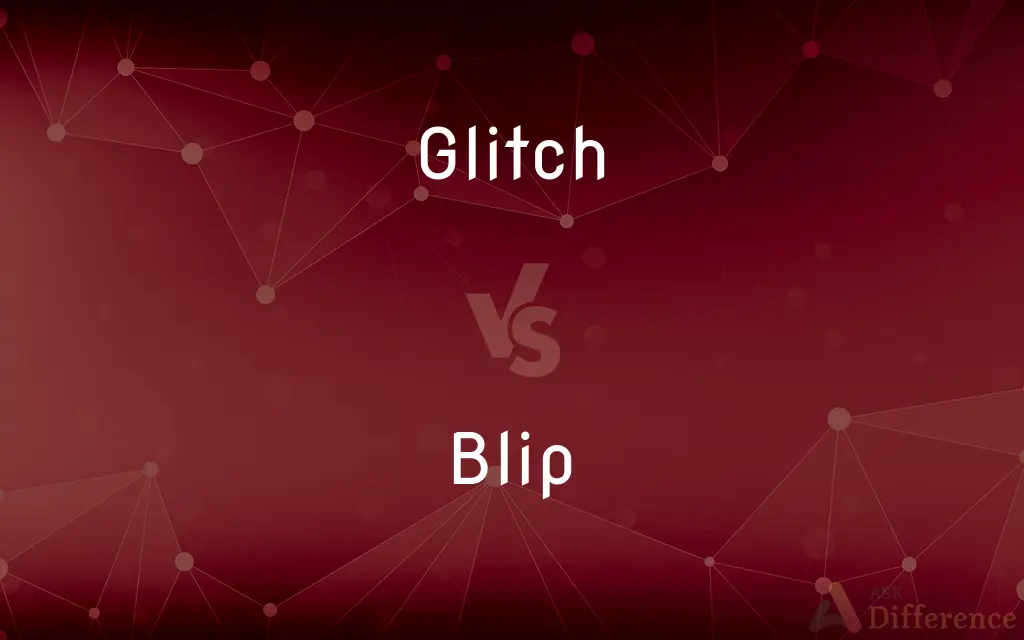Glitch vs. Blip — What's the Difference?
By Maham Liaqat & Fiza Rafique — Updated on April 2, 2024
A glitch is a short-lived fault in a system, while a blip is a temporary or minor deviation, often visual or on a radar.

Difference Between Glitch and Blip
Table of Contents
ADVERTISEMENT
Key Differences
Glitch refers to a brief and often inexplicable malfunction in a system, highlighting an unexpected error or failure. On the other hand, a blip usually denotes a small, temporary anomaly or deviation, typically in data, on a screen, or radar, suggesting a less severe and often easily correctable issue.
While glitches often imply a malfunction in software or electronic systems that can lead to operational failures or unexpected behavior, blips are generally seen as minor, transient issues that may not significantly impact overall functionality. Blips are often used to describe momentary disturbances in patterns or readings.
In the context of technology, a glitch can cause significant inconvenience or signal deeper issues within a system, necessitating troubleshooting and fixes to prevent recurrence. Whereas, a blip might indicate a fleeting problem or an insignificant change in the expected pattern, usually not requiring extensive action.
The term glitch carries connotations of technical issues that can potentially disrupt user experience or system performance. Conversely, blip is often used in situations where the anomaly does not have a lasting effect, such as in monitoring applications, highlighting temporary deviations from the norm.
Although both terms can describe irregularities, the nature and implications of a glitch versus a blip differ significantly. A glitch suggests a system error needing attention, while a blip, especially outside technical contexts, can also refer to brief interruptions or appearances, underscoring their variability in impact and interpretation.
ADVERTISEMENT
Comparison Chart
Definition
A short-lived fault in a system.
A minor, temporary deviation or anomaly.
Context
Often related to technical or electronic systems.
Can be used in various contexts, including data analysis and radar.
Severity
Implies a malfunction that may affect functionality.
Generally seen as less severe and transient.
Implications
May signal deeper issues needing fixes.
Usually does not have a lasting effect.
Interpretation
Connotes technical problems.
Can indicate momentary disturbances or appearances.
Compare with Definitions
Glitch
Can disrupt operations or user experience.
A minor glitch disrupted the online service for a few minutes.
Blip
A temporary deviation or minor anomaly.
The radar showed a blip that disappeared quickly.
Glitch
A brief fault or malfunction in a system.
A glitch in the software caused the computer to freeze.
Blip
Used in various scenarios, including radar and data analysis.
A blip in the data indicated a brief spike in temperature.
Glitch
Often requires troubleshooting to fix.
The development team quickly addressed the glitch with a patch.
Blip
Typically does not signify a major issue.
The blip on the screen was just a temporary error.
Glitch
Common in electronic and digital systems.
The game experienced a glitch that made the character invincible.
Blip
May not require any action if minor and transient.
The technicians noted the blip but found no underlying problems.
Glitch
Viewed as a flaw needing correction.
Users reported the glitch to the support team for immediate action.
Blip
Often seen as an insignificant or temporary anomaly.
Analysts considered the market blip too minor to affect trends.
Glitch
A glitch is a short-lived fault in a system, such as a transient fault that corrects itself, making it difficult to troubleshoot. The term is particularly common in the computing and electronics industries, in circuit bending, as well as among players of video games.
Blip
A spot of light on a radar or sonar screen indicating the position of a detected object, such as an aircraft or a submarine. Also called pip3.
Glitch
A minor malfunction, mishap, or technical problem; a snag
A computer glitch.
A navigational glitch.
A glitch in the negotiations.
Blip
A high-pitched electronic sound; a bleep.
Glitch
A false or spurious electronic signal caused by a brief, unwanted surge of electric power.
Blip
A transient sharp upward or downward movement, as on a graph.
Glitch
(Astronomy) A sudden change in the period of rotation of a neutron star.
Blip
A temporary or insignificant phenomenon, especially a brief departure from the normal
"The decline in the share of GNP going to health ... appears to be a one-time blip in the historic trend rather than the start of a new trend" (Atlantic).
Glitch
(countable) A problem affecting function.
They are still trying to work out all the glitches.
Blip
To bleep.
Glitch
An unexpected behavior in an electrical signal, especially if the signal spontaneously returns to expected behavior after a period of time.
Blip
(electronics) A small dot registered on electronic equipment, such as a radar or oscilloscope screen.
Glitch
(video games) A bug or an exploit.
Performing this glitch gives you extra lives.
Blip
A short sound of a single pitch, usually electronically generated.
Glitch
A genre of experimental electronic music since the 1990s, characterized by a deliberate use of sonic artifacts that would normally be viewed as unwanted noise.
Electronic music
Blip
(by extension) A brief and usually minor aberration or deviation from what is expected or normal.
Glitch
A sudden increase in the rotational frequency of a pulsar.
Blip
An individual message or document in the Google Wave software framework.
Glitch
To experience an unexpected, typically intermittent malfunction.
My computer keeps glitching; every couple of hours it just reboots without warning.
Blip
To change state abruptly, such as between off and on or dark and light, sometimes implying motion.
Glitch
To perform an exploit or recreate a bug while playing a video game.
His character will glitch into the wall and out of the level.
Blip
(transitive) bleep
Glitch
A fault or defect in a system, plan, or machine.
Blip
A spot of light on a radar screen, showing the position of a reflecting surface, such as an airplane or ship.
Glitch
A brief surge or interruption in the voltage in an electrical circuit or device.
Blip
A short upward or downward deviation from a trend line on a graph, especially in a plot of some variable, such as an economic variable, against time; as, a brief blip upward in the unemployment rate.
Glitch
A fault or defect in a system or machine
Blip
Something small or insignificant.
Blip
A brief interruption in the continuity of a recorded or transmitted signal; as, there is a blip on my CD of Beethoven's ninth.
Blip
A sudden minor shock or meaningless interruption;
The market had one bad blip today
You can't react to the day-to-day blips
Renewed jitters in the wake of a blip in retail sales
Blip
A radar echo displayed so as to show the position of a reflecting surface
Common Curiosities
How does a blip differ from a glitch?
A blip is a minor, often temporary deviation or anomaly, typically less severe than a glitch and may not affect overall functionality.
Is a blip always a technical issue?
No, blip can refer to any minor temporary deviation, not necessarily technical, including fluctuations in data or on displays.
What is a glitch?
A glitch is a short-lived technical malfunction in a system, often unexpected and requiring correction.
Can a glitch be permanent?
While glitches are generally temporary, if not addressed, they can indicate or lead to more permanent faults in a system.
Are all anomalies in systems considered glitches?
Not all anomalies are considered glitches; some may be classified as blips or bugs, depending on their nature and impact.
Why are blips important in data analysis?
Blips can indicate temporary anomalies or trends in data, important for identifying outliers or errors in analysis.
How serious is a glitch?
The seriousness of a glitch varies, but it can disrupt functionality and user experience, requiring prompt attention.
How can glitches be fixed?
Fixing a glitch often involves identifying the cause, applying a patch or update, and possibly restarting the system.
Can a blip be ignored?
In many cases, a blip can be ignored if it's deemed insignificant and does not recur, especially if it has no lasting impact.
How are blips detected?
Blips are often detected through monitoring systems, such as radars or data analysis tools, indicating a deviation from the norm.
Do glitches occur only in computers?
No, glitches can occur in any electronic system or software, not just in computers.
Do glitches and blips require technical expertise to resolve?
While some glitches and blips may be resolved with basic troubleshooting, others may require technical expertise to diagnose and fix.
What causes glitches?
Glitches can be caused by software bugs, hardware malfunctions, or issues in the system’s operation.
What does a blip on radar signify?
A blip on radar usually signifies a brief or minor object detection, which may or may not be significant.
Can glitches lead to data loss?
Yes, certain glitches can lead to data loss if they disrupt the system’s ability to save or process information correctly.
Share Your Discovery

Previous Comparison
Core vs. Processor
Next Comparison
Cromlech vs. DolmenAuthor Spotlight
Written by
Maham LiaqatCo-written by
Fiza RafiqueFiza Rafique is a skilled content writer at AskDifference.com, where she meticulously refines and enhances written pieces. Drawing from her vast editorial expertise, Fiza ensures clarity, accuracy, and precision in every article. Passionate about language, she continually seeks to elevate the quality of content for readers worldwide.













































